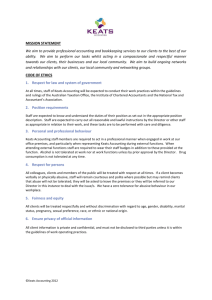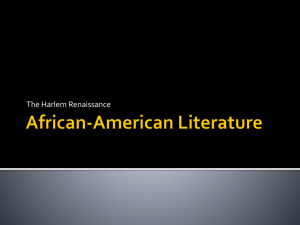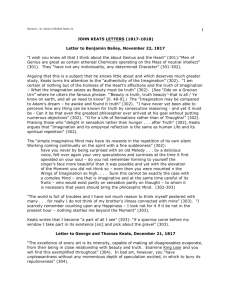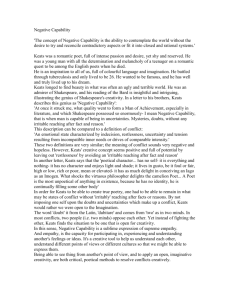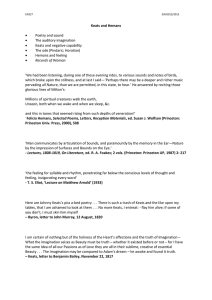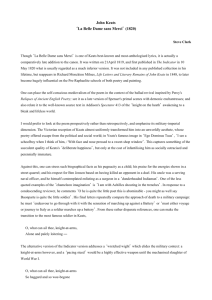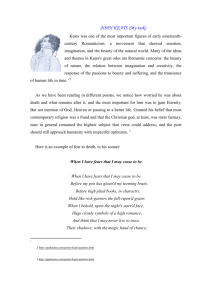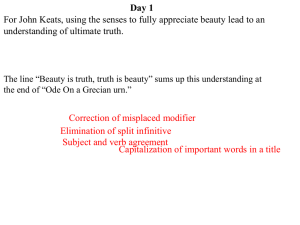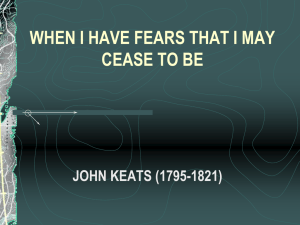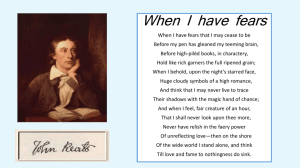Negative Capability
advertisement
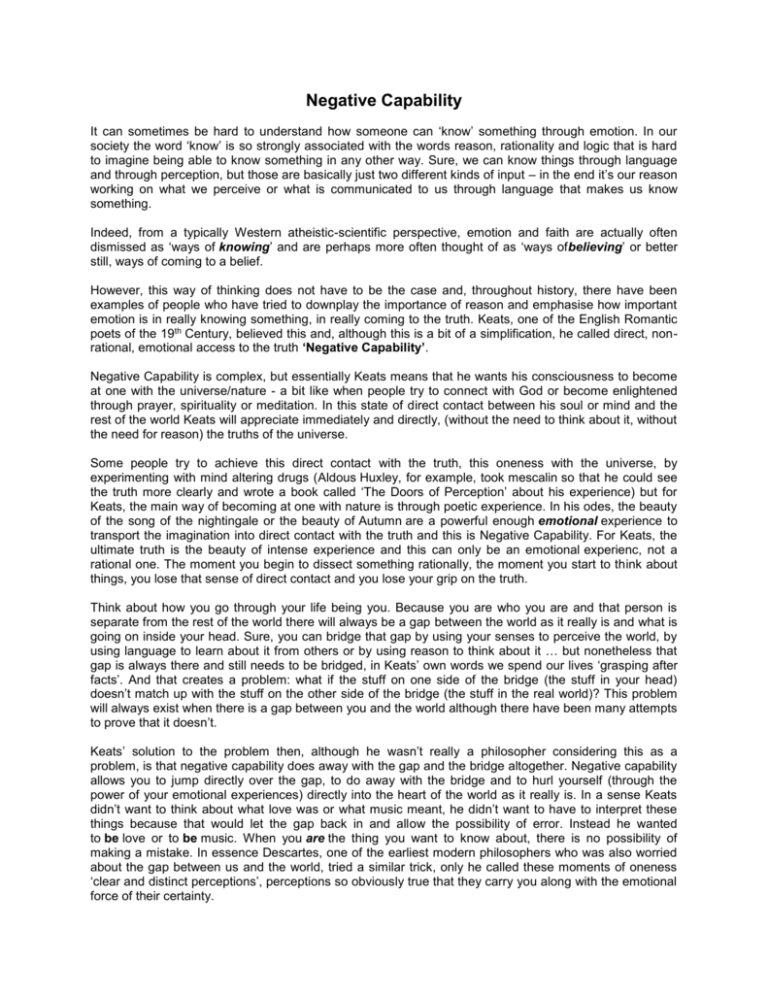
Negative Capability It can sometimes be hard to understand how someone can ‘know’ something through emotion. In our society the word ‘know’ is so strongly associated with the words reason, rationality and logic that is hard to imagine being able to know something in any other way. Sure, we can know things through language and through perception, but those are basically just two different kinds of input – in the end it’s our reason working on what we perceive or what is communicated to us through language that makes us know something. Indeed, from a typically Western atheistic-scientific perspective, emotion and faith are actually often dismissed as ‘ways of knowing’ and are perhaps more often thought of as ‘ways ofbelieving’ or better still, ways of coming to a belief. However, this way of thinking does not have to be the case and, throughout history, there have been examples of people who have tried to downplay the importance of reason and emphasise how important emotion is in really knowing something, in really coming to the truth. Keats, one of the English Romantic poets of the 19th Century, believed this and, although this is a bit of a simplification, he called direct, nonrational, emotional access to the truth ‘Negative Capability’. Negative Capability is complex, but essentially Keats means that he wants his consciousness to become at one with the universe/nature - a bit like when people try to connect with God or become enlightened through prayer, spirituality or meditation. In this state of direct contact between his soul or mind and the rest of the world Keats will appreciate immediately and directly, (without the need to think about it, without the need for reason) the truths of the universe. Some people try to achieve this direct contact with the truth, this oneness with the universe, by experimenting with mind altering drugs (Aldous Huxley, for example, took mescalin so that he could see the truth more clearly and wrote a book called ‘The Doors of Perception’ about his experience) but for Keats, the main way of becoming at one with nature is through poetic experience. In his odes, the beauty of the song of the nightingale or the beauty of Autumn are a powerful enough emotional experience to transport the imagination into direct contact with the truth and this is Negative Capability. For Keats, the ultimate truth is the beauty of intense experience and this can only be an emotional experienc, not a rational one. The moment you begin to dissect something rationally, the moment you start to think about things, you lose that sense of direct contact and you lose your grip on the truth. Think about how you go through your life being you. Because you are who you are and that person is separate from the rest of the world there will always be a gap between the world as it really is and what is going on inside your head. Sure, you can bridge that gap by using your senses to perceive the world, by using language to learn about it from others or by using reason to think about it … but nonetheless that gap is always there and still needs to be bridged, in Keats’ own words we spend our lives ‘grasping after facts’. And that creates a problem: what if the stuff on one side of the bridge (the stuff in your head) doesn’t match up with the stuff on the other side of the bridge (the stuff in the real world)? This problem will always exist when there is a gap between you and the world although there have been many attempts to prove that it doesn’t. Keats’ solution to the problem then, although he wasn’t really a philosopher considering this as a problem, is that negative capability does away with the gap and the bridge altogether. Negative capability allows you to jump directly over the gap, to do away with the bridge and to hurl yourself (through the power of your emotional experiences) directly into the heart of the world as it really is. In a sense Keats didn’t want to think about what love was or what music meant, he didn’t want to have to interpret these things because that would let the gap back in and allow the possibility of error. Instead he wanted to be love or to be music. When you are the thing you want to know about, there is no possibility of making a mistake. In essence Descartes, one of the earliest modern philosophers who was also worried about the gap between us and the world, tried a similar trick, only he called these moments of oneness ‘clear and distinct perceptions’, perceptions so obviously true that they carry you along with the emotional force of their certainty. Nice though this sounds, there is, however, a problem. Even if negative capability or this sense of oneness is possible (and many Buddhists might believe that it is) it is only ever something that you can experience for yourself. Any attempt to communicate the truths you have found out would have to be made using reason and using language and would thus lose the power of the direct emotional experience. As such, if negative capability can provide us with an emotional way of reaching the truth, the truth that it provides us with is one that we can never share with other people … and part of the whole point of the truth, is that it is something that we can all have in common. This is perhaps why Keats wrote poetry. He was attempting to evoke that emotional sense of oneness within his readers, to capture that sense of emotional intensity so that they could experience their own truths, because he couldn’t explain to them directly the truths that he perceived through negative capability. We may be skeptical about Keats’ success and the possibility of trying to actually be music, or be a beautiful sunset, but, if nothing else, this example illustrates one possible account of how emotions can help you know about the world.
